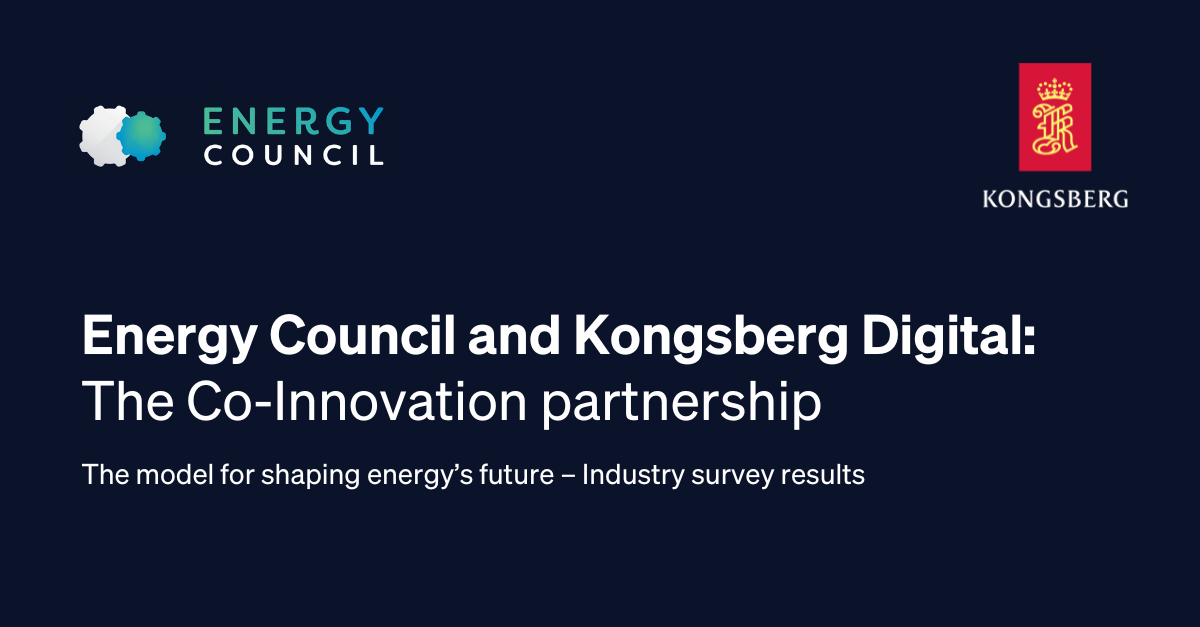December 10, 2024
Digital Maturity and Co-Innovation Deliver Financial Gains, new report states

Co-innovation, AI and digital transformation are unlocking financial and operational benefits in the energy sector. The findings, drawn from senior industry leaders in the report ‘The Co-Innovation Partnership,’ A Model for Shaping Energy’s Future highlight the growing role of partnerships and advanced technologies in addressing the energy trilemma of sustainability, affordability and energy security and using digital to enhance financial performance.
Developed by Kongsberg Digital and the Energy Council, the report provides a detailed look at the energy sector’s priorities, strategies, and progress in areas such as digital adoption and performance improvements, alternative energy projects, and the transition to net zero.
This report confirms that digitalization has moved well beyond dashboards to driving decisions that accelerate business performance. Organizations that are more digitally mature and are applying digital collaboratively for decision-making and performance are realizing 3-4% higher Return on Asset (ROA) than their peers, underscoring the advantages and financial rewards of investing in digital strategically.
Shane McArdle, CEO, Kongsberg Digital
Key Insights from the Report
- Close to 70% of executives identify external partnerships as critical to accelerating the energy transition, emphasizing the value of collaboration in achieving cost efficiency and innovation.
- A significant 83% of companies have made technology and supplier partnerships a core part of their digital strategies, reinforcing the importance of co-innovation in driving transformation.
- Organizations with advanced digital maturity report a 3–4% higher Return on Assets (ROA) than their peers, highlighting the financial rewards of investing in digital tools and strategies.
- 50% of companies are using digital technologies to improve direct asset performance, but many still face barriers in phasing out legacy systems and achieving full digital integration.
- Cybersecurity and data transformation lead the list of technology investment priorities, reflecting their central role in operational resilience and regulatory compliance.
- Carbon Capture, Utilization, and Storage (CCUS) is the most actively pursued alternative energy technology, with nearly half of respondents advancing these projects to piloting or deployment stages.
- Approximately 80% of companies agreed that applying digital will increase the quality and speed of decision-making, yet only 20% of respondents are doing so. Indicating an opportunity to improve financial performance by investing in this area.
- While 72% of companies have achieved advanced digital maturity during the design phase, only 28% have extended these capabilities into operational phases, pointing to opportunities for further digital integration.
The findings spotlight the growing reliance on partnerships with technology providers, operational suppliers, and public/private collaborations to tackle industry-wide challenges. Leaders agree that co-innovation is essential for achieving operational efficiencies, improving decision-making and accelerating sustainability goals.
These findings make it clear that collaboration and digital transformation transcend industry buzzwords – they are vital strategies for navigating the intricacies of the energy transition. By harnessing these innovative approaches, the energy sector can markedly improve operational efficiency, enhance decision-making, and achieve crucial sustainability targets. Insights from industry leaders highlight the critical role of partnerships and the adoption of advanced technologies to drive progress toward a more sustainable and efficient energy landscape.
Lyle Simpson, CEO, Energy Council
Author

Kongsberg Digital
Kongsberg Digital is a provider of next-generation software and digital solutions to customers within oil and gas, chemicals and offshore wind. Its Industrial Work Surface, powered by the Kognitwin® platform, is redefining how industries work with data, insight and decision-making.
Related news

February 9, 2026
Kongsberg Digital partners with Google Cloud to scale industrial intelligence solutions through secure, AI-driven infrastructure

December 15, 2025
Kongsberg Digital signs AI digital twin agreement with Vår Energi

November 24, 2025
Kongsberg Digital and AIQ enter strategic collaboration to drive AI-powered optimisation for energy transformation

November 3, 2025
Wood and Kongsberg Digital partner to deliver lifecycle digital twin solutions for industrial operations